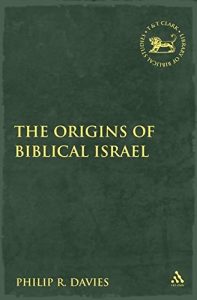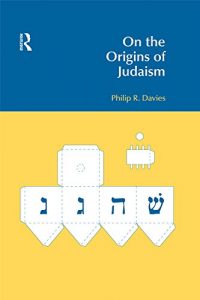DAVIES, P. R. The Origins of Biblical Israel. London: Bloomsbury T&T Clark, 2009, 208 p. – ISBN 9780567137616
Diz a editora:
 The book starts from the problem defined by recent archaeological discovery about the societies that formed the backbone of the kingdoms of Israel and Judah, their origins and their relationship. It has become clear that the biblical notion of a 12-tribe ‘nation’ united by descent and religion does not correspond to these findings. The challenge is not to argue endlessly about how far the differing accounts can be reconciled, as a prolongation of an old debate about biblical ‘historicity’, but to try and understand what historical, social and cultural process led to the production of the biblical portrait of an Israel of 12 tribes embracing two kingdoms. Davies argues for the importance of the role of Bethel as a royal sanctuary, then a central sanctuary of the Neo-Babylonian and Persian province of Judah. In particular, the figure of Jacob as the ancestor of ‘Israel’, associated with Bethel, became the eponym of the biblical ‘all Israel’ and the name ‘Israel’ survived as the name of a new society, even as Jerusalem was re-established as the major, and subsequently the only, official Judaean temple.
The book starts from the problem defined by recent archaeological discovery about the societies that formed the backbone of the kingdoms of Israel and Judah, their origins and their relationship. It has become clear that the biblical notion of a 12-tribe ‘nation’ united by descent and religion does not correspond to these findings. The challenge is not to argue endlessly about how far the differing accounts can be reconciled, as a prolongation of an old debate about biblical ‘historicity’, but to try and understand what historical, social and cultural process led to the production of the biblical portrait of an Israel of 12 tribes embracing two kingdoms. Davies argues for the importance of the role of Bethel as a royal sanctuary, then a central sanctuary of the Neo-Babylonian and Persian province of Judah. In particular, the figure of Jacob as the ancestor of ‘Israel’, associated with Bethel, became the eponym of the biblical ‘all Israel’ and the name ‘Israel’ survived as the name of a new society, even as Jerusalem was re-established as the major, and subsequently the only, official Judaean temple.
DAVIES, P. R. On the Origins of Judaism. Abingdon: Routledge, 2014, 183 p. – ISBN 9781845533267.
Deste livro diz a editora:
This book covers several basic issues in the formation of early Judaism. It explores the identity of those who produced and canonized the Hebrew Bible and subsequently shaped its interpretation, re-examines the significance and impact of Second Isaiah, and the books of Ezra and Nehemiah, traces the root of Jewish apocalyptic literature, and the possible origins of the exodus story. Two final chapters consider the mechanics of table fellowship in diaspora Judaism and consider the ethical systems of the Hebrew Bible and of the Athenian tragedians in the light of their respective social and political structures. Some of these essays have previously appeared but all have been revised.
shaped its interpretation, re-examines the significance and impact of Second Isaiah, and the books of Ezra and Nehemiah, traces the root of Jewish apocalyptic literature, and the possible origins of the exodus story. Two final chapters consider the mechanics of table fellowship in diaspora Judaism and consider the ethical systems of the Hebrew Bible and of the Athenian tragedians in the light of their respective social and political structures. Some of these essays have previously appeared but all have been revised.